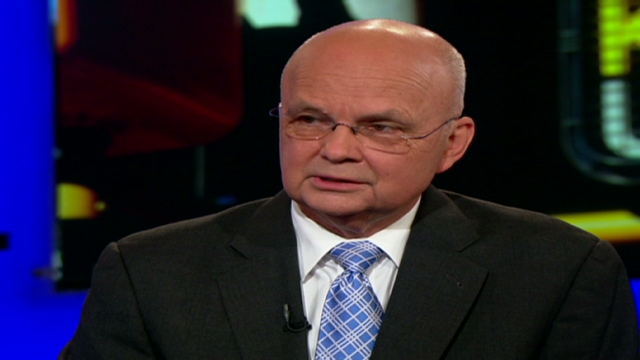Near term, entered a more dangerous period. But long-term, this is a great success.
Former CIA Director Gen. Michael Hayden talks to CNN’s John King about the threat of terrorism after bin Laden’s death. This interview aired on CNN’s John King, USA at 7pm ET. A highlight from the full interview is after the jump and full transcript is posted at CNN.com.
EMBEDDABLE VIDEO: Former CIA director Gen. Michael Hayden talks to John King about the intelligence that led to the death of bin Laden.
MANDATORY CREDIT: JOHN KING, USA
HIGHLIGHT FROM FULL INTERVIEW
THIS IS A RUSH FDCH TRANSCRIPT. THIS COPY MAY NOT BE IN ITS FINAL FORM AND MAY BE UPDATED.
JOHN KING, HOST: What is the significance of the death of bin Laden? Can he be replaced?
MICHAEL HAYDEN, FORMER CIA DIRECTOR: We’re going to see. We’re going to see.
I had always talked about this when people said what would happen if bin Laden would die, he would be removed from the scene, he’s not very active, he doesn’t have operational control. I’m not so sure that was totally true. But he certainly was an iconic figure.
But he was a Yemeni-Saudi iconic figure. And there’s always been a divide inside al Qaeda between the Gulf Arabs and the Egyptians.
Zawahiri, the number two, is an Egyptian. Let’s see al Qaeda go through a succession crisis.
KING: So, who in your mind is the face of global terror right now? Is it al-Zawahiri, the Egyptian, the number two to Osama bin Laden? Or is it a 40-year-old American, al-Awlaki, al Qaeda in the Arabian Peninsula?
HAYDEN: Now, I know Mike Leiter, the head of the National Counterterrorism Center, has said the most potent threat to the homeland right now is coming from Yemen. But, specifically, to answer your question who is the most potent global face of terrorism, I think it’s Zawahiri, somewhere along the Afghan-Pakistan border.
KING: What have the detainees told you over the year about the al Qaeda playbook? I assume that they knew that perhaps bin Laden someday would be killed or captured. Do they have a plan to retaliate, to attack in the event of that?
HAYDEN: I don’t know about a plan specifically. I would expect it. You would now feel and I know Secretary Napolitano, Director Panetta, others have indicated we could see a spasmodic, violent response from al Qaeda.
Even with plans that are not yet fully hatched. They need to re-establish their street creds, so to speak.
So, for the near term, we may have actually entered a more dangerous period. But over the long-term, this is a great success.
KING: Would you be today — if you were still on the job as director of central intelligence — be worried about mass attacks, several attacks, a lone wolf?
HAYDEN: Obviously, you’d be worried about them all. But the most likely, the ones that they would rush forward would be probably the low intense, lone wolf kind of attacks, rather than the big, complex, slow-moving attack against t iconic target. They just can’t pull that out of a hat.
In fact, they’re having trouble pulling those off even when they have a lot of time.
###
